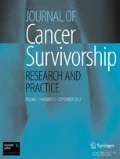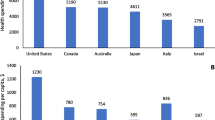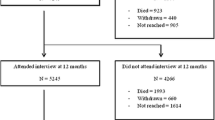Abstract
Purpose
To examine whether the implementation of Affordable Care Act (ACA) reduced the financial burden associated with cancer care among non-elderly cancer survivors.
Methods
Using data from the MEPS-Experiences with Cancer Survivorship Survey, we examined whether there was a difference in financial burden associated with cancer care between 2011 (pre-ACA) and 2016 (post-ACA). Two aspects of financial burden were considered: (1) self-reported financial burden, whether having financial difficulties associated with cancer care and (2) high-burden spending, whether total out-of-pocket (OOP) spending incurred in excess of 10% or 20% of family income. Generalized linear regression models were estimated to adjust the OOP expenditures (reported in 2016 US dollar).
Results
Our sample included adults aged 18–64 with a confirmed diagnosis of any cancer in 2011 (n = 655) and in 2016 (n = 490). There was no apparent difference in the prevalence of cancer survivors reporting any financial hardship or being with high-burden spending between 2011 and 2016. The mean OOP decreased by $268 (95% CI, − 384 to − 152) after the ACA. However, we found that the mean premium payments increased by $421 (95% CI, 149 to 692) in the same period.
Conclusions
The ACA was associated with reduced OOP for health services but increased premium contributions, resulting in no significant impact on perceived financial burden among non-elderly cancer survivors.
Implications for cancer survivors
The financial hardship of cancer survivorship points to the need for the development of provisions that help cancer patients reduce both perceived and materialized burden of cancer care under ongoing health reform.


Similar content being viewed by others
References
Miller KD, Siegel RL, Lin CC, Mariotto AB, Kramer JL, Rowland JH, et al. Cancer treatment and survivorship statistics, 2016. CA Cancer J Clin. 2016;66(4):271–89. https://doi.org/10.3322/caac.21349.
Mariotto AB, Robin Yabroff K, Shao Y, Feuer EJ, Brown ML. Projections of the cost of cancer care in the United States: 2010-2020. J Natl Cancer Inst. 2011;103(2):117–28. https://doi.org/10.1093/jnci/djq495.
Akushevich I, Kravchenko J, Akushevich L, Ukraintseva S, Arbeev K, Yashin AI. Medical cost trajectories and onsets of cancer and noncancer diseases in US elderly population. Comput Math Methods Med. 2011;2011:1–14. https://doi.org/10.1155/2011/857892.
Finkelstein EA, Tangka FK, Trogdon JG, Sabatino SA, Richardson LC. The personal financial burden of cancer for the working-aged population. Am J Manag Care. 2009;15(11):801–6.
Guy GP, Yabroff KR, Ekwueme DU, et al. Healthcare expenditure burden among non-elderly cancer survivors, 2008-2012. Am J Prev Med. 2015;49(6):S489–97. https://doi.org/10.1016/j.amepre.2015.09.002.
Yabroff KR, Dowling EC, Guy GP, et al. Financial hardship associated with cancer in the United States: findings from a population-based sample of adult cancer survivors. J Clin Oncol. 2016;34(3):259–67. https://doi.org/10.1200/JCO.2015.62.0468.
Zheng Z, Yabroff KR, Guy GP, et al. Annual medical expenditure and productivity loss among colorectal, female breast, and prostate cancer survivors in the United States. J Natl Cancer Inst. 2016;108(5):1–9. https://doi.org/10.1093/jnci/djv382.
Carrera PM, Kantarjian HM, Blinder VS. The financial burden and distress of patients with cancer: understanding and stepping-up action on the financial toxicity of cancer treatment. CA Cancer J Clin. 2018;68(2):153–65. https://doi.org/10.3322/caac.21443.
Yabroff KR, Lund J, Kepka D, Mariotto A. Economic burden of cancer in the United States: estimates, projections, and future research. Cancer Epidemiol Biomark Prev. 2011;20(10):2006–14. https://doi.org/10.1158/1055-9965.EPI-11-0650.
Ramsey S, Blough D, Kirchhoff A, Kreizenbeck K, Fedorenko C, Snell K, et al. Washington state cancer patients found to be at greater risk for bankruptcy than people without a cancer diagnosis. Health Aff. 2013;32(6):1143–52. https://doi.org/10.1377/hlthaff.2012.1263.
Shankaran V, Jolly S, Blough D, Ramsey SD. Risk factors for financial hardship in patients receiving adjuvant chemotherapy for colon cancer: a population-based exploratory analysis. J Clin Oncol. 2012;30(14):1608–14. https://doi.org/10.1200/JCO.2011.37.9511.
Neumann PJ, Palmer JA, Nadler E, Fang C, Ubel P. Cancer therapy costs influence treatment: a National Survey of Oncologists. Health Aff. 2010;29(1):196–202. https://doi.org/10.1377/hlthaff.2009.0077.
Obama B. United States health care reform. JAMA. 2016;316(5):525–32. https://doi.org/10.1001/jama.2016.9797.
Hong YR, Holcomb D, Bhandari M, Larkin L. Affordable care act: comparison of healthcare indicators among different insurance beneficiaries with new coverage eligibility. BMC Health Serv Res. 2016;16(1):114. https://doi.org/10.1186/s12913-016-1362-1.
United States Census Bureau. Health insurance coverage in the United States: 2016.
Hong YR, Jo A, Mainous AG. Up-to-date on preventive care services under affordable care act: a trend analysis from MEPS 2007-2014. Med Care. 2017;55(8):771–80. https://doi.org/10.1097/MLR.0000000000000763.
Goldman AL, Woolhandler S, Himmelstein DU, Bor DH, McCormick D. Out-of-pocket spending and premium contributions after implementation of the affordable care act. JAMA Intern Med. 2018;178(3):347–55. https://doi.org/10.1001/jamainternmed.2017.8060.
Davidoff AJ, Guy GP, Hu X, et al. Changes in health insurance coverage associated with the affordable care act among adults with and without a cancer history. Med Care. 2018;56(3):220–7. https://doi.org/10.1097/MLR.0000000000000876.
Mulcahy AW, Eibner C, Finegold K. Gaining coverage through medicaid or private insurance increased prescription use and lowered out-of-pocket spending. Health Aff. 2016;35(9):1725–33. https://doi.org/10.1377/hlthaff.2016.0091.
National Cancer Institute. Medical Expenditure Panel Survey (MEPS): experiences with cancer survivorship supplement. https://healthcaredelivery.cancer.gov/meps/. Published 2018. Accessed October 3, 2018.
Yabroff KR, Dowling E, Rodriguez J, Ekwueme DU, Meissner H, Soni A, et al. The medical expenditure panel survey (MEPS) experiences with cancer survivorship supplement. J Cancer Surviv. 2012;6(4):407–19. https://doi.org/10.1007/s11764-012-0221-2.
Hamel MB, Blumenthal D, Abrams M, Nuzum R. The affordable care act at 5 years. N Engl J Med. 2015;372(25):2451–8. https://doi.org/10.1056/NEJMhpr1503614.
Guy GP, Ekwueme DU, Yabroff KR, et al. Economic burden of cancer survivorship among adults in the United States. J Clin Oncol. 2013;31(30):3749–57. https://doi.org/10.1200/JCO.2013.49.1241.
Agency for Healthcare Research and Quality. MEPS HC-192: 2016 Full Year Consolidated Data File. https://meps.ahrq.gov/data_stats/download_data/pufs/h192/h192doc.shtml. Published 2018. Accessed September 28, 2018.
Banthin JS, Bernard DM. Changes in financial burdens for health care. JAMA. 2006;296(22):2712–9. https://doi.org/10.1001/jama.296.22.2712.
Agency for Healthcare Research and Quality. MEPS topic-priority condition. https://meps.ahrq.gov/data_stats/MEPS_topics.jsp. Published 2009. Accessed October 15, 2018.
Deb P, Norton EC. Modeling health care expenditures and use. Annu Rev Public Health. 2018;39(1):489–505. https://doi.org/10.1146/annurev-publhealth-040617-013517.
Bureau of Labor Statistics. Medical care in consumer price index. http://data.bls.gov/timeseries/CUUR0000SAM?output_view=pct_12mths. Published 2017. Accessed October 18, 2016.
Andersen RM, Davidson PL, Baumeister SE. Improving access to care. In: Changing the US Health Care System: key issues in health services policy and management, vol. 2013. San Francisco, CA: Jossey-Bass. p. 33–69.
Ekwueme DU, Yabroff KR, Guy GP, et al. Medical costs and productivity losses of cancer survivors--United States, 2008-2011. MMWR Morb Mortal Wkly Rep. 2014;63(23):505–10 http://www.ncbi.nlm.nih.gov/pubmed/24918485.
Chino F, Peppercorn JM, Rushing C, Nicolla J, Kamal AH, Altomare I, et al. Going for broke: a longitudinal study of patient-reported financial sacrifice in cancer care. J Oncol Pract. 2018;14(9):e533–46. https://doi.org/10.1200/JOP.18.00112.
Claxton G, Rae M, Long M, Damico A, Whitmore H, Foster G. Health benefits in 2016: family premiums rose modestly, and offer rates remained stable. Health Aff. 2016;35(10):1908–17. https://doi.org/10.1377/hlthaff.2016.0951.
Garfield R, Damico A, Stephens J, Rouhani S. The coverage gap: uninsured poor adults in states that do not expand Medicaid - an update. Kaiser Fam Found. 2014;(October:1–8.
Blumberg L, Holahan J, Wengle E. Increases in 2016 marketplace nongroup premiums: there is no meaningful national average. The Urban Insitute. https://www.rwjf.org/content/dam/farm/reports/issue_briefs/2016/rwjf429398. Published 2016. Accessed October 1, 2018.
Schleicher SM, Wood NM, Lee S, Feeley TW. How the Affordable Care Act has affected cancer care in the United States: has value for cancer patients improved? Oncology (Williston Park). 2016;30(5):468–74 doi:217053.
Hong YR, Huo J, Mainous AG. Care coordination management in patient-centered medical home: analysis of the 2015 medical organizations survey. J Gen Intern Med. 2018;33(7):1004–6. https://doi.org/10.1007/s11606-018-4439-1.
American Society of Clinical Oncology. American Society of Clinical Oncology position statement on addressing the affordability of cancer drugs. https://www.asco.org/sites/new-www.asco.org/files/content-files/blog-release/documents/2017-ASCO-Position-Statement-Affordability-Cancer-Drugs.pdf?et_cid=39454952&et_rid=1760459169&linkid=position+statement. Published 2017. Accessed November 1, 2018.
The Henry J. Kaiser Family Foundation. The coverage gap: uninsured poor adults in states that do not expand Medicaid. https://www.kff.org/medicaid/issue-brief/the-coverage-gap-uninsured-poor-adults-in-states-that-do-not-expand-medicaid/. Published 2018. Accessed September 30, 2018.
Schoen C. The Affordable Care Act and the U.S. economy: a five-year perspective. The Commonwealth Fund. https://www.commonwealthfund.org/publications/fund-reports/2016/feb/affordable-care-act-and-us-economy. Published 2016. Accessed November 1, 2018.
Author information
Authors and Affiliations
Contributions
• Study conception and design: Hong and Huo
• Acquisition, analysis, or interpretation of data: All authors
• Drafting of manuscript: Hong
• Critical revision of the manuscript for important intellectual content: Smith, Mainous, and Huo
• Statistical analysis: Hong and Huo
• Administrative, technical, or material support: Hong and Xie
• Study supervision: Huo and Mainous
Corresponding author
Ethics declarations
Conflict of interest
The authors declare that they had no conflict of interest.
Ethical approval
This study was deemed exempt from review by the University of Florida Institutional Review Board because the use of publicly available dataset did not constitute human subjects research.
Informed consent
Since we used deidentified data, informed consent from the participants was not required.
Additional information
Publisher’s note
Springer Nature remains neutral with regard to jurisdictional claims in published maps and institutional affiliations.
Appendix
Appendix
Rights and permissions
About this article
Cite this article
Hong, YR., Smith, G.L., Xie, Z. et al. Financial burden of cancer care under the Affordable Care Act: Analysis of MEPS-Experiences with Cancer Survivorship 2011 and 2016. J Cancer Surviv 13, 523–536 (2019). https://doi.org/10.1007/s11764-019-00772-y
Received:
Accepted:
Published:
Issue Date:
DOI: https://doi.org/10.1007/s11764-019-00772-y




